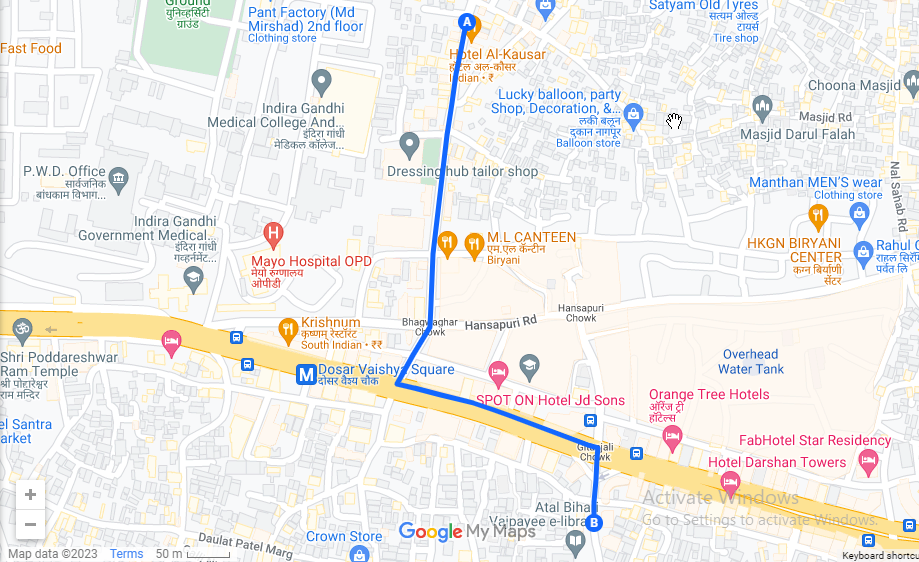Hearing Loss (Deafness) Treatment in Nagpur focuses on addressing various causes of hearing impairment to improve individuals’ auditory function and overall quality of life. Dr. Darakshan Parveen, a distinguished specialist in hearing loss treatment with 17+ years of experience. Using cutting-edge techniques and personalized approaches to enhance patients’ hearing capabilities, providing comprehensive care and support for optimal outcomes.

DR. DARAKSHAN PARVEEN
ENT SURGEON
Qualification:
- Qualified from the Government Medical College Agra.
- Postgraduate training in Otorhinolaryngology-Head and Neck Surgery from government medical college Meerut
Experience:
- Over 17 years of experience
- Visting consultant at HCG NCHRI Hospital and Crescent Hospital
How To Reach Dr Darakshan’s Clinic:
The Nearest Public Transport Station To Dr Darakshan’s Clinic:
Nearby Bus Stop
- Gitanjali Square: 130 meters away from Dr Darakshan’s Clinic
- Seva Sadan Bhavan: 350 meters away from Dr Darakshan’s Clinic
Nearby Metro Station
- Dosar Bhawan Metro Station: 350 meters away from Dr Darakshan’s Clinic
- Agrasen metro station: 600 meters away from Dr Darakshan’s Clinic
- Meyo Hospital Metro Station: 550 meters away from Dr Darakshan’s Clinic
What is deafness and how does it affect individuals?
Deafness is a condition characterized by partial or complete loss of hearing. It can be congenital or acquired due to factors like illness, injury, or age. Deafness affects individuals by limiting their ability to perceive sounds, communicate effectively, and engage in social interactions. It can lead to feelings of isolation, difficulty in academic or professional settings, and challenges in accessing information or services designed primarily for hearing individuals. Assistive devices like hearing aids or cochlear implants may help mitigate its impact.
What are the typical reasons behind hearing loss?
Typical reasons behind hearing loss include genetic factors, prolonged exposure to loud noises, aging (presbycusis), infections such as otitis media or meningitis, traumatic injuries to the ear, ototoxic medications, and certain medical conditions like Meniere’s disease. Other potential causes include autoimmune diseases affecting the inner ear, tumors, and abnormalities in the ear structure. Identifying the specific cause of hearing loss is crucial for determining appropriate treatment and management strategies.
Why is it crucial to seek treatment for hearing loss?
It is crucial to seek treatment for hearing loss because untreated hearing impairment can significantly impact one’s quality of life. Communication difficulties can lead to social isolation, strained relationships, and decreased participation in activities. Additionally, untreated hearing loss has been linked to cognitive decline, depression, and an increased risk of accidents and falls. Seeking treatment early can help mitigate these negative consequences, improve communication abilities, and enhance overall well-being.
How is hearing loss diagnosed and evaluated?
Hearing loss is diagnosed and evaluated through a series of tests conducted by an audiologist. These tests may include:
Audiometry:
This involves wearing headphones and listening to tones at various frequencies to determine the softest sounds that can be heard.
Speech testing:
Assessing the ability to recognize and repeat words at different volume levels.
Tympanometry:
Measuring the movement of the eardrum in response to changes in air pressure to evaluate middle ear function.
Otoacoustic emissions (OAE) testing:
Measuring the sounds produced by the inner ear in response to stimuli to assess cochlear function.
Physical examination:
Checking for ear abnormalities or signs of infection.
Medical history review:
Discussing symptoms, past illnesses, medications, and exposure to loud noises.
These evaluations help determine the type, degree, and possible causes of hearing loss, guiding appropriate treatment and management strategies.
How do hearing aids help individuals with hearing loss?
Hearing aids help individuals with hearing loss by amplifying sounds and improving their ability to perceive speech and environmental sounds. These devices consist of a microphone to pick up sounds, an amplifier to increase their volume, and a speaker to deliver the amplified sound into the ear. Modern hearing aids often include advanced features such as noise reduction, directional microphones, and feedback cancellation to enhance speech clarity and reduce background noise.
How do cochlear implants work to restore hearing?
Cochlear implants work by bypassing damaged parts of the inner ear and directly stimulating the auditory nerve to restore hearing. The implant consists of two main components: an external processor and an internal implant.
External processor:
Microphones on the processor pick up sounds from the environment, which are then converted into digital signals. These signals are transmitted wirelessly to the internal implant.
Internal implant:
The internal implant is surgically placed under the skin behind the ear. It receives the digital signals from the external processor and converts them into electrical impulses. These impulses are sent to an array of electrodes inserted into the cochlea.
Electrode array:
The electrodes stimulate the auditory nerve fibers within the cochlea, bypassing damaged hair cells. The nerve then sends these signals to the brain, where they are interpreted as sound.
By directly stimulating the auditory nerve, cochlear implants can provide significant hearing improvement for individuals with severe to profound hearing loss who do not benefit from conventional hearing aids.
When are surgical interventions recommended for hearing loss?
Surgical interventions for hearing loss are recommended in various situations, including:
Chronic ear infections:
Surgery may be necessary to address recurrent infections, repair damaged structures, or remove obstructions in the middle ear.
Otosclerosis:
Stapedectomy or stapedotomy surgery can treat conductive hearing loss caused by otosclerosis by replacing or modifying the stapes bone in the middle ear.
Tumors:
Surgical removal of tumors such as acoustic neuromas or meningiomas may be necessary to preserve or restore hearing function and prevent further complications.
Cochlear implants:
Surgical placement of cochlear implants is recommended for individuals with severe to profound sensorineural hearing loss who do not benefit from hearing aids.
Traumatic injuries:
Surgery may be required to repair damage to the ear structures caused by trauma, such as tympanic membrane perforations or ossicular chain dislocations.
Overall, the decision to pursue surgical intervention for hearing loss depends on the underlying cause, severity of the condition, individual patient factors, and potential benefits and risks of the procedure.
What strategies can be used to improve communication for individuals with hearing loss?
Several strategies can improve communication for individuals with hearing loss:
Reduce background noise:
Minimize noisy environments or move to quieter areas to make it easier for individuals with hearing loss to focus on speech.
Speak clearly and at a moderate pace:
Avoid shouting or speaking too quickly, and articulate words clearly to enhance understanding.
Use visual aids:
Supplement verbal communication with visual cues, gestures, and written notes to provide additional context and clarity.
Assistive listening devices:
Utilize hearing aids, cochlear implants, or personal amplification systems to enhance sound perception and communication effectiveness.
Communication training:
Participate in communication workshops or classes designed to improve listening skills, speechreading, and communication strategies for individuals with hearing loss and their communication partners.
By implementing these strategies, individuals with hearing loss can overcome communication barriers and engage more effectively in social, professional, and everyday interactions.
Individuals dealing with hearing loss have access to a range of treatment options, from hearing aids and cochlear implants to surgical interventions and communication strategies. Seeking timely treatment and adopting lifestyle changes can significantly improve one’s quality of life despite hearing challenges.











